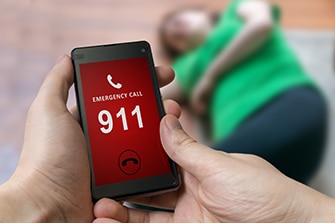Opioid Overdose: Signs, Symptoms, and What to Do
Any individual who uses opioids runs the risk of overdosing. Overdoses can be fatal. In fact, more than 130 people in the United States die after overdosing on opioids every day. This makes it important to know what causes an opioid overdose, the signs that an opioid overdose is occurring, and what to do in the event of an opioid overdose.
Opioid Overdose Causes
In 2017, the CDC reported that more than 15,000 individuals died from drug overdoses involving heroin in the United States. That’s almost 5 deaths for every 100,000 Americans. However, there are some people who may be more susceptible to opioid overdose than others. This can include:
- Adults between the ages of 25 and 54 years old
- Individuals taking higher doses than prescribed of prescription opioids
- Individuals who inject opioids
- Using opioids while also having certain medical conditions such as HIV, liver or lung disease
- Individuals who suffer from mental health conditions such as depression or PTSD
- Combining opioids with other substances
Individuals who have had at least one non-fatal overdose already
Nonfatal Overdoses
All opioid overdoses run the risk of becoming fatal, especially if left untreated. However, nonfatal overdoses are several times more common – a 2017 study published by the U.S. National Library of Medicine found that about 45 percent of drug users will experience nonfatal overdose and about 70 percent will witness drug overdose (both nonfatal and fatal) during their lifetime.
Nonfatal overdoses can cause life-long health problems, including:
- Aspiration pneumonia
- Pulmonary edema
- Bronchopneumonia
- Rhabdomyolysis
- Muscle tissue breakdown
- Hypoxic brain injury
- Peripheral neuropathy
- Renal failure
- Cognitive impairment
- Traumatic injuries
Opioid Overdose Signs
There are three main signs of an opioid overdose, which are collectively referred to as the opioid overdose triad.
The opioid overdose triad consists of:
- Pinpoint pupils (i.e. contracted and small)
- Respiratory depression
- A decreased level of consciousness or unconsciousness
When an individual is exhibiting the opioid overdose triad, it is crucial that medical intervention takes place as soon as possible. This is because respiratory depression can cause an individual to stop breathing completely, as well as causing the heart to stop beating. Both of these things lead to death.
What to Do During an Opioid Overdose
- Call 911. Act quickly. The first thing and individual should do in the event of an opioid overdose is call 911 as soon as possible. Many individuals do not do this because they are afraid of legal consequences due to illegal drug use, but saving a life is much more important and will be the sole focus of emergency personnel.
- Turn the individual on their side. One of the many symptoms of an opioid overdose is vomiting, so it is important that the individual is turned on their side to avoid choking and stay with them until emergency personnel arrives.
- Administer Narcan, if available. Narcan reverses the effects of opioids, which can stop an opioid overdose from progressing. Narcan is available over-the-counter at most major pharmacies and is covered by some insurance plans.
- Encourage treatment. There is no better time to encourage recovery than after a life-threatening overdose. Presenting treatment options as quickly as possible can help them avoid relapse and another potentially fatal overdose event.
Preventing an Opioid Overdose
The best way to prevent an overdose is to abstain from opioids completely. However, this can seem unrealistic for individuals who are prescribed opioids and require pain management solutions. The Substance Abuse and Mental Health Services Administration recommends the following strategies to prevent opioid overdose deaths:
- Have access to Narcan. As mentioned, Narcan can be life-saving in overdose situations. Any person who uses opioids should have Narcan on-hand, even if they do not believe they would ever overdose.
- Get treatment for opioid abuse. Opioids are highly addictive and dependency can form quickly. As such, it can be difficult for people to stop taking them alone. Luckily, there are ways to safely taper off of opioids, live a life free of opioid addiction, and avoid a deadly opioid overdose.
- Find new ways to manage chronic pain. Many individuals who use opioids began to do so because they suffer from some type of chronic pain. This can make it difficult to seek treatment. However, there are many ways to manage chronic pain, such as physical therapy, yoga, acupuncture, and more.
About Cliffside Malibu
An opioid overdose — whether fatal or not — is a realistic event for anyone who uses opioids. Knowing the causes, signs, and what to do are crucial for all individuals who use opioids, and the loved ones of individuals who use opioids. Getting treatment and safely weaning off of opioids is the most important part of using opioids, and is the best way to ensure an opioid overdose does not happen aside from abstinence.
Since no two addictions are the same, Cliffside Malibu offers an individualized treatment plan for every client. We are committed to providing evidence-based treatment through a continuum of care model including medically supervised detox, residential treatment, day treatment, and outpatient services. Our program also includes family therapy and holistic therapy, as well. Whether an individual is suffering from substance abuse and/or alcohol addiction, our programs are structured to create a supportive environment where healing can begin.
In addition to world-class treatment, Cliffside Malibu offers luxury accommodations, a serene environment, five-star dining, and plentiful amenities. We understand that addiction treatment is a rigorous process. Therefore, we provide for your comfort and relaxation at every turn, allowing you to rejuvenate, and meet the demands of treatment with your greatest energy and attention.
For more information on Cliffside Malibu, visit cliffsidemalibu.com
